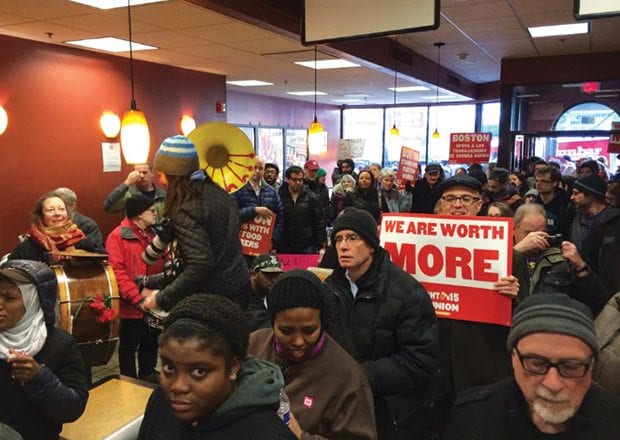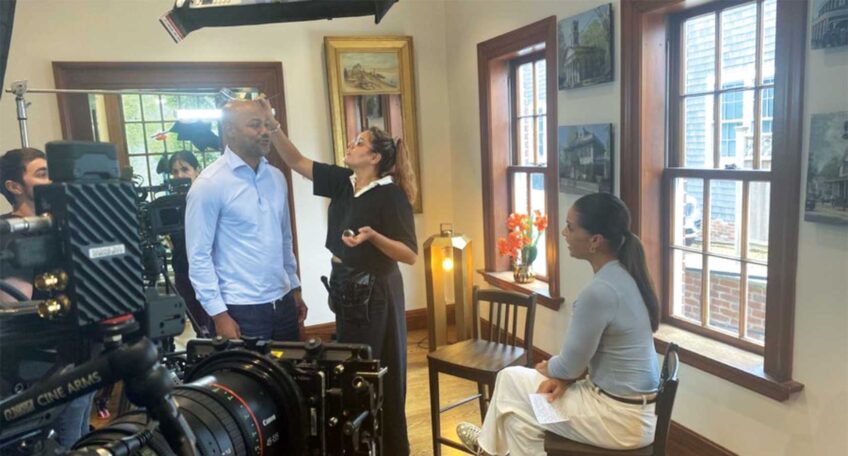

Author: Photos courtesy of Fight for $15“Fight for $15” protesters gather at Burger King in Downtown Crossing as part of the nationwide protest on Dec. 4.
Massachusetts restaurant workers and living wage advocates took to the streets in protest late last week in the national Fight for $15 campaign, joining protesters in almost 200 cities across the United States — this despite Massachusetts already passing one of the highest minimum wage hikes in the country and also seeing voters approve a ballot question last month to guarantee earned sick time to most workers.
The protest, held on Dec. 4, targeted mostly fast-food chains in Massachusetts and saw throngs of employees from some of the top brands — McDonald’s, Burger King and Dunkin’ Donuts — fill stores and encourage others to walk off the job.
A Burger King location in Boston’s Downtown Crossing was the pinnacle of protests in Massachusetts, along with a McDonald’s and a Dunkin’ Donuts in Chelsea. The rallying cries were “Low pay is not OK” and “We are worth more.”
U.S. Senator from Massachusetts Elizabeth Warren was quick to back the protesting workers.
“Fast food workers deserve a livable wage to keep families out of poverty,” she said. “When they fight, I’m proud to fight alongside them.”
Supported predominantly by social justice organizations and unions, the Fight for $15 campaign began two years ago with a bullseye on fast-food stores in particular. While the battle has been muddied by pushback from corporate chains, some who say that individual store owners control the pay rates, the protests have captured politicians’ attention and expanded the fight to include other low-paying jobs at retail stores, convenience stores and airports.
The protesters in Boston joined others in major cities including Atlanta, Chicago, Detroit, Los Angeles, Milwaukee, New York, Oakland, Philadelphia and Seattle. Other smaller cities — in particular areas with struggling economies, including Jackson, Miss., Knoxville, Tenn. and Buffalo — also joined the fray.
In Washington, D.C., the protest saw 650 federal contract workers walk off fast-food jobs at well-known landmarks, including the National Zoo.
SEIU International, a union with a large membership in Massachusetts, backed the protests throughout the nation. SEIU President Mary Kay Henry called Fight for $15 a growing movement aimed at fighting American’s broken economic system.
“Millions of working men and women across this country — white, black and brown — have stood up and stood out together, mounting their offense against extremism and inequality,” Henry said. “Families, co-workers and communities are fighting for justice on all fronts, in the workplace and in streets. The economy and our country are out of balance because so many people are trying to raise families on service sector paychecks, but are getting crushed as corporations use their power to push down the wage floor.”
McDonald’s was one of the few corporations targeted that acknowledged the protesters’ efforts. The fast-food giant released a statement intended to summarize its position saying that 90 percent of its U.S. restaurants — more than 3,000 locations — are independently owned and operated by franchisees who set wages according to job level and local and federal laws and that the corporation does not determine wages at these stores.
“At McDonald’s we respect everyone’s right to peacefully protest. The topic of minimum wage goes well beyond McDonald’s — it affects our country’s entire workforce. McDonald’s and our independent franchisees support paying our valued employees fair wages aligned with a competitive marketplace,” the statement said.
Currently, federal minimum wage is $7.25. President Barack Obama backed a bill to raise it to $10.10 by 2016, but this legislation is stalled in Congress. As such, the hope has turned to state and city governments, which can raise the minimum wage on their own.
During elections last month, a number of states, as well as San Francisco and Oakland, approved increases in the minimum wage. Just last week, Chicago approved a jump in minimum wage from $8.25 to $13 by 2019. When 2015 hits, the minimum wage will be higher than the federal minimum wage in 29 states.
The National Employment Law Project reports that recent efforts to boost the minimum wage will raise earnings for over 600,000 U.S. workers.
Massachusetts has seen big victories for labor activists in the state in the past year.
In June, Gov. Deval Patrick signed legislation that will gradually raise the state’s minimum wage to $11 by 2017, up from the current state minimum wage of $8.
Last month, when Massachusetts voters hit the booths in the November elections, they approved Question 4, which will guarantee every worker in Massachusetts access to the benefit of earned sick time and prohibit employer retaliation against workers who take time off due to illness when it takes effect on July 1, 2015.
At companies with 10 or fewer employees, workers will earn up to 40 hours of unpaid sick time to visit the doctor or take care of a sick family member. At companies with 11 or more employees, workers will earn up to 40 hours of paid sick time.






